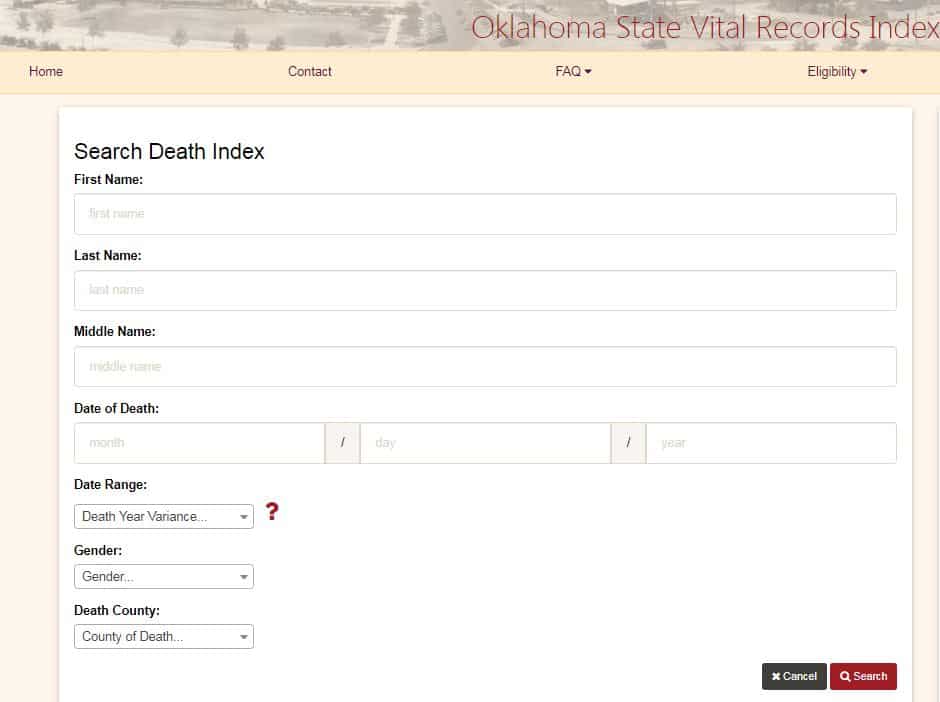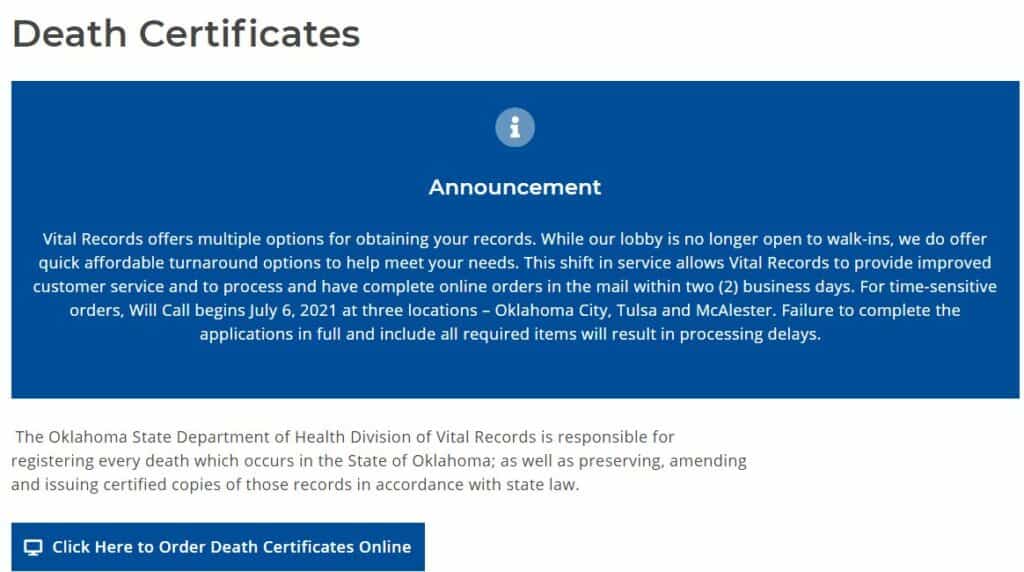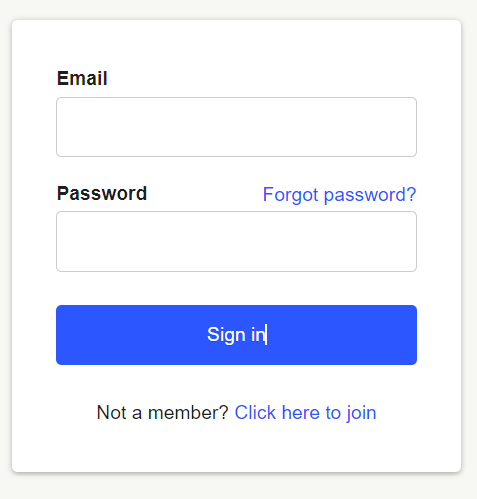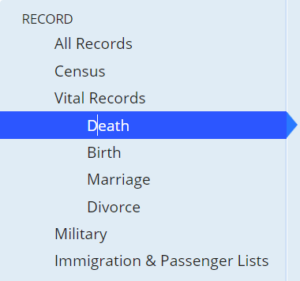
Search for Death Records in Oklahoma
Free Oklahoma Death Records Lookup

We receive referral fees from partners (advertising disclosure)
The information we provide you is free of charge and a result of extensive research by our product experts. We use affiliate links in our site that provide us with referral commissions. While this fact may not influence the information we provide, it may affect the positioning of this information.


Oklahoma's extensive death records database offers a convenient and efficient means to access essential information about the deceased and their life before their passing. This resource enables you to swiftly and easily retrieve death records, greatly enhancing your ability to gather pertinent details.

Death Records in Oklahoma -
The Ultimate Guide 2026
- UPDATED February 2026
Oklahoma Death Records
Most Oklahoma counties commenced their death documentation efforts after the state’s admission to the Union in 1907. However, the Chickasaw Nation, the Creek Nation, and the Cherokee Outlet boast records dating back to the early 1800s, except for a handful of earlier documents. The formal statewide registration of deaths in Oklahoma was mandated in 1908, and by 1930, this regulation was largely adhered to throughout the state.


Before 1908
Before 1908, the state had not established a system to record deaths. However, a limited number of earlier death records are found within the records of the Chickasaw Nation, Creek Nation, and Cherokee Outlet, as well as the records of the Chickasaw Nation and Creek Nation. Depending on their whereabouts, some of these records may be accessible through the present-day counties. These records have been microfilmed and are accessible through FamilySearch Centers, libraries, and various other sources. To identify the nearest FamilySearch Center, please refer to their locations.
To facilitate your search, you can utilize the FamilySearch Catalog. If you possess an approximate date of the death and the county in which it occurred, you can identify accessible records by county. Access the FamilySearch Catalog, select the “Vital Records” topic from the drop-down menu, and scrutinize documents created by the county clerk. Some records may have been compiled and made available to the public. The availability of microfilms for viewing at a local Family Search Center may vary based on location. If the death record is not found within the microfilm records, further investigation of alternative sources will be necessary to determine your ancestor’s date and place of death
After 1908
In 1908, Oklahoma implemented a statewide requirement for death registration, and by 1930, this regulation was largely adhered to throughout the state. While county clerks are responsible for recording deaths and providing information upon request, it’s important to note that death certificates can only be obtained through the Vital Records Section of the New Jersey Department of Health and Human Services. Prior to 1940, the organization of records was somewhat haphazard, making it essential to navigate this historical data with care and consideration.
Death Certificates in Oklahoma
The prevailing consensus is that death records become accessible to the general public only after a lapse of 75 years from the record’s filing date. At this juncture, they are released for public access. While it is feasible to obtain death certificates for individuals who have passed away within the last 75 years, there exist various restrictions contingent on specific circumstances. Eligibility for obtaining death certificates encompasses a range of categories, with the most common of these including:
- The registrant, to whom the record is directly associated.
- Spouse of the deceased individual.
- Parents of the deceased.
- Descendants, such as children or grandchildren.
- Individuals sharing common ancestry, including cousins, aunts, uncles, siblings, or grandparents.
- The legal guardian of the registrant.
- An agency or individual acting on behalf of the registrant.
- Legal representatives of the registrant's estate.

How to Find Oklahoma Death Records
Oklahoma death records are readily accessible through Archives.com, which is a highly reputable source. If you’ve previously registered on the platform, you can gain immediate access to the state of Oklahoma’s death records as soon as you log in, irrespective of when you initially registered. To get started, follow these straightforward steps:
Step 1: Visit Archives.com and log in using your email address and password to access your archived items and digital assets.

Step 2: Navigate through the configuration options available at the top of your user page. Click on the “Search” button, which will take you to the Oklahoma State Death Records Website.

Step 3: Click on the “Vital Records” box, followed by the “Death” button just below it.

Step 4: Provide the necessary information about the deceased.

Step 5: Enter “Oklahoma” as the location.
Step 6: A list of records will be displayed; simply scroll through the list until you find the specific person whose records you wish to view.
Step 7: Click on the name of the deceased to access the available death record online.
Additionally, there are alternative sources for obtaining death-related information in Oklahoma, including resourceful websites, obituaries, courthouses, city directories, and tax records.
Death records are official documents containing valuable information about a deceased individual after their passing, making them indispensable for genealogy research. These records typically include essential data such as the full name, date of birth, date of death, and the location of death, among other pertinent details.
Regarding the public accessibility of Oklahoma death records, individuals with a direct relationship to the individual named on the vital record can obtain access under Oklahoma Revised Statutes. This includes birth certificates, divorce decrees, marriage certificates, adoption certificates, death certificates, and various other life records.
To search for Oklahoma death records online, requesters should be well-informed about the following fundamental details associated with the record:
- Deceased’s name
- Valid reason for death record request
- Death date
- County or city of death
- Valid proof of identification
Conclusion
Oklahoma places great importance on the accuracy of its tax and voting records, a commitment reflected in its state records, including comprehensive death records. These records play a crucial role, especially when tax collectors need to contact family members or next of kin to collect any unpaid state taxes following an individual’s passing. In the context of probate proceedings, these death records prove extremely valuable, facilitating the acquisition of essential legal information. With our comprehensive guide to conducting Oklahoma death record searches, you can efficiently locate any specific record you may require within minutes.
Disclaimer: OurPublicRecords mission is to give people easy and affordable access to public record information, but OurPublicRecords does not provide private investigator services or consumer reports, and is not a consumer reporting agency per the Fair Credit Reporting Act. You may not use our site or service or the information provided to make decisions about employment, admission, consumer credit, insurance, tenant screening, or any other purpose that would require FCRA compliance.

Copyright © 2026 · OurPublicRecords.org · All Rights Reserved